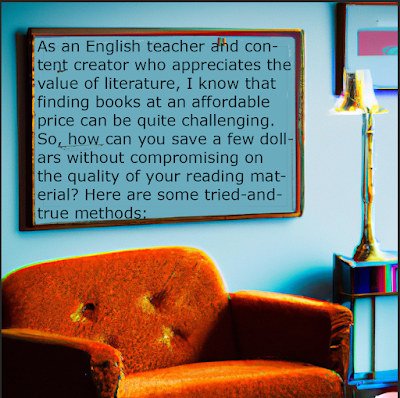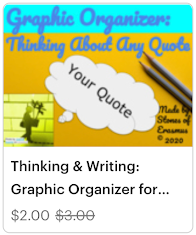Stones of Erasmus — Just plain good writing, teaching, thinking, doing, making, being, dreaming, seeing, feeling, building, creating, reading
2.10.23
Day 16 of 180: Acknowledging I'm #TeacherTired While Asking Students to Go Deeper in Their Writing
 I am an educator and a writer. I was born in Louisiana and I now live in the Big Apple. My heart beats to the rhythm of "Ain't No Place to Pee on Mardi Gras Day". My style is of the hot sauce variety. I love philosophy sprinkles and a hot cup of café au lait.
I am an educator and a writer. I was born in Louisiana and I now live in the Big Apple. My heart beats to the rhythm of "Ain't No Place to Pee on Mardi Gras Day". My style is of the hot sauce variety. I love philosophy sprinkles and a hot cup of café au lait.
9.9.23
Unveiling Mythology to Teens: Insights from the Humanities Classroom
 | |
| Storm-Tossed and Star Crossed: Paris and Helen's Epic Journey to Troy |
 I am an educator and a writer. I was born in Louisiana and I now live in the Big Apple. My heart beats to the rhythm of "Ain't No Place to Pee on Mardi Gras Day". My style is of the hot sauce variety. I love philosophy sprinkles and a hot cup of café au lait.
I am an educator and a writer. I was born in Louisiana and I now live in the Big Apple. My heart beats to the rhythm of "Ain't No Place to Pee on Mardi Gras Day". My style is of the hot sauce variety. I love philosophy sprinkles and a hot cup of café au lait.
30.8.23
The Power of Sustained Reading in an Age of Distraction
 |
| Concept Art "Reading is Essential, Children," made by one of my Tenth Graders. |
 I am an educator and a writer. I was born in Louisiana and I now live in the Big Apple. My heart beats to the rhythm of "Ain't No Place to Pee on Mardi Gras Day". My style is of the hot sauce variety. I love philosophy sprinkles and a hot cup of café au lait.
I am an educator and a writer. I was born in Louisiana and I now live in the Big Apple. My heart beats to the rhythm of "Ain't No Place to Pee on Mardi Gras Day". My style is of the hot sauce variety. I love philosophy sprinkles and a hot cup of café au lait.
29.8.23
Prudence, Wisdom, and Self-Care: The Uncommon Story of Zeus and Metis
We've all heard of Zeus, the King of the Gods, known for his godly escapades and tumultuous love affairs. However, little is spotlighted about Metis, Zeus’s first wife and the Greek personification of prudence. Often sidelined by mainstream mythological tales, the story of Zeus and Metis carries essential lessons on prudence, wisdom, and self-care—virtues that have seemingly fallen by the wayside in today's fast-paced world.
The Misunderstanding of Prudence
Unfortunately, prudence often suffers from a negative connotation, easily confused with being a prude or overly cautious. Yet, the virtue signifies the art of making thoughtful and balanced decisions that bring the least harm and greatest good. A case in point is Prudential, one of America’s leading insurance companies, built on the very tenets of safeguarding and caution.
The Transformative Tale of Zeus and Metis
In Greek mythology, Metis embodies the virtue of prudence. Pursued by Zeus, she transforms into various animals to escape his advances—a common trope in Greek mythology. Zeus, afraid that Metis would bear a child more powerful than him, swallows her whole. While this may seem like the end for Metis, she continues to live within Zeus, imparting wisdom and prudential advice.
Wisdom Versus Prudence
The child born from this unique union is Athena, the goddess of wisdom. However, it's suggested that Athena lacks the maternal warmth that defined Metis. Herein lies the nuanced difference between wisdom and prudence: wisdom often focuses on knowledge and rational decisions, while prudence adds an emotional layer, emphasizing care for oneself and others.
The Self-Care Connection
The Living Legacy of Metis
While Metis might have met an unfortunate end, her essence lived on, both in Zeus’s wisdom and Athena’s intellect. This eternal legacy serves as a lesson that prudence, wisdom, and self-care are deeply intertwined virtues, worth much more than their misunderstood reputations.
Through the tale of Zeus and Metis, we find a treasure trove of life lessons waiting to be applied in our own lives. Far from being forgotten, their story teaches us that prudence is not a constraint.
 |
| Find Mythology Content and More! On the Stones of Erasmus Store |
 I am an educator and a writer. I was born in Louisiana and I now live in the Big Apple. My heart beats to the rhythm of "Ain't No Place to Pee on Mardi Gras Day". My style is of the hot sauce variety. I love philosophy sprinkles and a hot cup of café au lait.
I am an educator and a writer. I was born in Louisiana and I now live in the Big Apple. My heart beats to the rhythm of "Ain't No Place to Pee on Mardi Gras Day". My style is of the hot sauce variety. I love philosophy sprinkles and a hot cup of café au lait.
28.8.23
How to Find Cheap Books: A Savvy Reader’s Guide
Reading is a lifelong passion of mine. I've bought books from garage sales for a dollar, and I've also purchased expensive hardcovers from museum bookstores. It's all part of being a book lover! But let's face it: books can get expensive.
Online Marketplaces
- Amazon Used Books: When it comes to purchasing books online, Amazon is a go-to destination. But before you click "Buy Now" on that brand-new hardcover, take a moment to explore the used book options. Often, reputable sellers like Better World Books offer used copies for as little as $1 to $3. However, keep in mind that shipping and handling costs can add up, so consider that in your budgeting.
- Other Online Vendors: Besides Amazon, websites like AbeBooks and Better World Books provide affordable book options. You'll have to pay shipping, but if a book usually costs $30, you could find it for as little as $10. Keep in mind that used books, whether you buy them online or at a shop, often have evidence of use, such as folded pages and markings inside the books left by previous owners. When shopping online for used books, be sure to read the description notes carefully, as sellers will tell you the condition of the book. Each used book is different!
Annual Sales and Book Fairs
- Major Annual Book Sales: If you live in a large metropolitan area, keep an eye out for major annual book sales like the Symphony Book Sale in New Orleans run by the Louisiana Philharmonic Orchestra. They rent out the University of New Orleans arena to sell their books! In New York, if you like antiquarian books (which are definitely more expensive), go to the annual Antiquarian Book Sale. These events often offer thousands of books for as low as $1. Yes, it's almost like a treasure hunt for book lovers!
- Don't know what's available in your area? Look for non-profit organizations, hospitals, schools, churches, temples, synagogues, mosques, and other venues to see if they have book sales. When I worked at a small liberal arts college, you'd be amazed at how many donations of books we'd receive. So it doesn't hurt to ask around to see if organizations have books to either sell cheaply or even give away.
Local Discoveries
- Your Local Book Shop: Yes, locally-owned bookshops still exist! Support them and buy a book. Even bookshops that sell new books at full price often have books for sale in a bin or in a box. Just ask. The classy Argosy bookshop in New York has an outside table with books for as little as a dollar.
- Specialized Bookstores: If you're in a place like New York City, visiting used bookstores like The Strand near Union Square or Argosy Books in Midtown Manhattan can be a treat. If you're on the West coast — try Moe's. These stores often put out cheaper books on tables outside the shop. The drawback? They might not have the latest releases or bestsellers.
- Neighborhood Garage Sales: Never underestimate the power of a weekend garage sale. Many people put out books they no longer need, and you can often find gems for free or at a nominal price.
- Public Libraries: Your local library might have sales or even give away books that are being taken out of circulation. Although time-consuming, the hunt can yield rich rewards.
- Street Vendors: On major avenues like Malcolm X Boulevard or Broadway, or in Union Square, you'll often find men with tables full of books, usually going for a dollar.
- Thrift Stores: Don't underestimate the joy of discovering a unique find at Goodwill, The Salvation Army, or Housing Works! While these thrift stores primarily focus on kitchen utensils and clothing, they often feature a book bin or a dedicated wall for used books. Generally, thrift stores offer the lowest prices, but keep in mind that they don't curate their book selection. The condition you find the book in is what you get.
The Joy of Serendipity
- Serendipity: Sometimes the best finds are unplanned. While walking around your neighborhood or grabbing a coffee, you might stumble upon free books that people leave outside their homes.
- Free Books: Yes, you can find various places that offer books for free. Libraries and religious organizations are common sources, as well as individuals like the woman who leaves books on her stoop. Additionally, neighborhood organizations often sponsor "Little Free Libraries," where you can take a book and leave one in return. Personally, I have a soft spot for the Brooklyn Book Bodega (full disclosure—I volunteer there), which provides free books to New Yorkers.
Tips for eBook Lovers
Finding cheap eBooks is trickier. However, if you're adept at internet searches, you might find a PDF version of the book you're looking for, although the legality of this varies.
So, there you have it: a plethora of options to get your hands on cheap books. Whether you prefer physical copies or eBooks, there's something out there for every budget-conscious reader. Happy reading!
 I am an educator and a writer. I was born in Louisiana and I now live in the Big Apple. My heart beats to the rhythm of "Ain't No Place to Pee on Mardi Gras Day". My style is of the hot sauce variety. I love philosophy sprinkles and a hot cup of café au lait.
I am an educator and a writer. I was born in Louisiana and I now live in the Big Apple. My heart beats to the rhythm of "Ain't No Place to Pee on Mardi Gras Day". My style is of the hot sauce variety. I love philosophy sprinkles and a hot cup of café au lait.
27.8.23
Unlock Your Learning Potential: 16 Essential Resources at Just $2 Each! 🌟
As the school year gets into full swing—or if you're like me, gearing up to start teaching right after Labor Day—the need for effective educational tools for our middle and high school students couldn't be more crucial.
In reviewing some of my most valued resources, I was thrilled to discover that 16 of them are available for just $2 each! Now that's a deal worth exploring!
Key Features:
- Easy-to-use — with printable PDFs and student-facing digital materials for each resource.
- Resources were all modified this Summer, ensuring up-to-date content.
Sharpen Your Analytical Skills
- Introduce resources aimed at analytical skills like:
- "Thinking & Writing: Graphic Organizer for Analyzing Quotes & Textual Evidence"
- "Opposing Viewpoints Debate: On Judging Appearances"
Master The Writing Process
- Focus on resources that target writing skills:
- "Detail Observation Guide: Enhance Narrative & Expository Writing"
- "Prewriting-Drafting-Revising: ELA Writing Cycle Guide"
Tools for Organized Learning
- Resources that help students stay organized:
- "Student Writing Presentation Toolbox for Middle & High School"
- "Student Writer's Portfolio Tracker: Organize & Showcase Work"
Multi-dimensional Writing
- Resources that help students explore different modes and purposes of writing:
- "Writing Modes: ELA Exercise for Improving Writing Skills"
- "Purpose & Mode in Writing: Comprehensive Chart for Student Success"
Boost Creative and Factual Writing
- Resources that offer brainstorming and research techniques:
- "Using Print & Non-Print Sources | Classroom Success for Writing"
- "Clustering Guide: Brainstorming Activity for ELA/Writing Students"
Reading for Success
- Encourage independent reading:
- "Teen Book List: Promoting Independent Reading for Grades 7-12"
Conclusion
Call to Action:
 I am an educator and a writer. I was born in Louisiana and I now live in the Big Apple. My heart beats to the rhythm of "Ain't No Place to Pee on Mardi Gras Day". My style is of the hot sauce variety. I love philosophy sprinkles and a hot cup of café au lait.
I am an educator and a writer. I was born in Louisiana and I now live in the Big Apple. My heart beats to the rhythm of "Ain't No Place to Pee on Mardi Gras Day". My style is of the hot sauce variety. I love philosophy sprinkles and a hot cup of café au lait.
17.8.23
Shaping Tomorrow's Citizens: Education, Religion, and Cultural Norms in the Classroom
In this blog post from Stones of Erasmus, I connect philosophical ideas with practical aspects of teaching and societal values. Let's invite reflection on the role of education, the influence of religion, and the importance of cultural norms in shaping the citizens of tomorrow.
 |
| The sun may appear small and lightbulb-like to the viewer, but it's actually a massive fusion-powered fireball that sustains life on Earth. |
Parity in the Classroom: The Common Gifts of Our Students
In every classroom, there lies a hidden world of potential. That gossipy student in the back row? Perhaps a budding playwright, weaving tales for the stage. Our students are not just learners; they are creators, thinkers, and future citizens.
The Personal Stance vs. The Professional Stance
Education is not just about imparting knowledge; it's a national effort to produce productive citizens. But what does that mean?
Producing productive citizens is about nurturing individuals who contribute positively to society and the economy. It's about fostering responsibility, hard work, and a commitment to the common good. It's about developing skills like problem-solving, communication, and teamwork that are vital in today's workforce.
The Image of Citizenship: A Reflection of Values
What should citizens of a country look like? The nineteenth-century image of the American family was a myth, yet it shaped perceptions. Today, we recognize that there is no one specific way citizens should look. Every individual is unique, bringing their own strengths and perspectives. The goal is to cultivate responsible, engaged members of society who contribute to the common good.
Religion and Education: A Complex Relationship
"Orderliness is godliness." This saying reflects how we often infuse public education with ideology, including the notion to "pull yourself up by your bootstrap." But do religious influences benefit the school system?
The Puritans were able to impose their ideology, but the relationship between religion and education is complex. Some believe that religious values can create moral grounding and community. Others see challenges in separating church and state, ensuring inclusivity for all students.
Folkways and Mores: The Fabric of Society
Folkways and mores are the threads that weave the social fabric. Folkways are the everyday customs and traditions, while mores are the deeper, moral values that guide a culture. Together, they shape our collective identity.
Opinions: The Personal Take on Knowledge
An opinion is more than a fleeting thought; it's your unique perspective on what you know. It's a reflection of your understanding, your beliefs, and your individuality.
PDF Copy for Printing
 I am an educator and a writer. I was born in Louisiana and I now live in the Big Apple. My heart beats to the rhythm of "Ain't No Place to Pee on Mardi Gras Day". My style is of the hot sauce variety. I love philosophy sprinkles and a hot cup of café au lait.
I am an educator and a writer. I was born in Louisiana and I now live in the Big Apple. My heart beats to the rhythm of "Ain't No Place to Pee on Mardi Gras Day". My style is of the hot sauce variety. I love philosophy sprinkles and a hot cup of café au lait.














